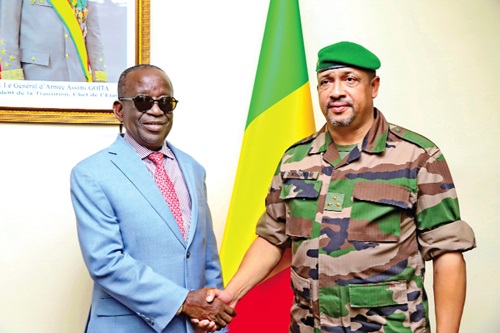The Minister of National Security, Albert Kan-Dapaah, has emphasised the need for security experts to lead the fight against terrorism, underscoring that the complexities of terrorism in Africa, particularly in the Sahel, demand nuanced approaches beyond political interests.
He stressed that unlike in some jurisdictions where terrorism usually sought a symbolic or ideological impact, terrorism in Africa posed an immediate territorial threat, aiming to establish influence across swathes of land and affecting countless communities.
Delegation to Mali
Mr Kan-Dapaah made the statements in the Malian capital, Bamako, when he led senior officials of Ghana’s security and intelligence agencies into strategic discussions with their Malian counterparts in a major step towards enhancing regional security cooperation.
The Ghanaian delegation included the Chief of Army Staff, Major General Bismarck Kwasi Onwona, and other senior military officers.
Mali’s team was led by that country’s Minister of National Security and Civil Protection, General Aly Mohammedine, with other senior security officials of the Malian government in attendance at last Friday’s high-level meeting.
The meeting followed similar engagements with Burkina Faso, Cote d’Ivoire and Togo as Ghana sought to champion collaborative efforts against terrorism and insecurity in the West African sub-region.
Mr Kan-Dapaah pointed out that Mali’s extensive experience in counterterrorism operations made the country a crucial partner for any effective regional response.
“Without Mali’s cooperation, combating terrorism within West Africa would be nearly impossible,” he said.
Acknowledging the high stakes, he warned that without prompt and coordinated action, the terrorist threat could become unmanageable within two years, threatening the stability and safety of the entire sub-region.
Regional challenges
The meeting also reflected on broader regional challenges to security cooperation, particularly in the light of recent developments within West Africa.
The establishment of the Alliance of Sahel States and the exit of its member states from the Economic Community of West African States (ECOWAS) signalled growing tensions in the sub-region and posed significant challenges to security partnerships.
In response, Mr Kan-Dapaah called for renewed bilateral agreements rooted in trust and cooperation, and proposed a re-evaluation of relationships within the sub-region to ensure effective collaboration.
Mali’s Gen. Mohammedine praised Mr Kan-Dapaah for his extensive experience and objective approach to addressing regional security.
He insisted that security remained a foundational development pillar, and reiterated Mali’s commitment to tackling terrorism as a borderless threat, underscoring the importance of solidarity among African nations.
Gen. Mohammedine expressed optimism that public support for security initiatives could strengthen the influence of Mali’s army and enhance collaborative security efforts with regional allies, including Ghana.
Regional front
The Ghana-Mali security collaboration discussions are part of Ghana’s ongoing efforts to consolidate a regional front against terrorism, a mission Ghana has led since 2017 with the establishment of the Accra Initiative.
By spearheading this initiative, Ghana has persistently promoted cooperative security solutions, bringing together West African nations to address transnational threats.
Amid recent political tensions and realignments within ECOWAS, Ghana continues to demonstrate its commitment to regional stability and solidarity, positioning itself as a critical partner in tackling terrorism and fortifying West African security.
This latest engagement with Mali reaffirms Ghana’s enduring leadership role and the nation’s readiness to support its neighbours, a move that advances collaborative efforts to safeguard the stability and resilience of the West African sub-region.
ALSO READ:

